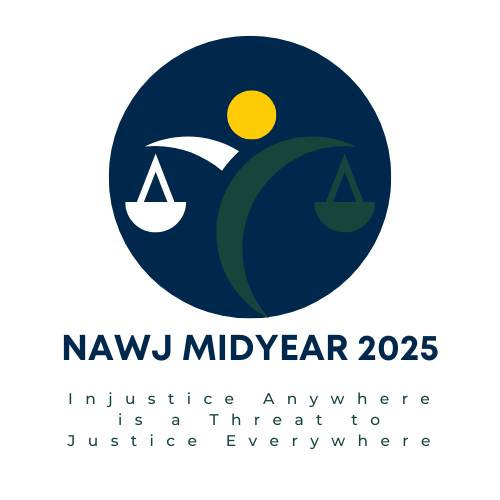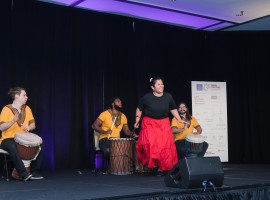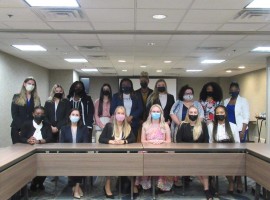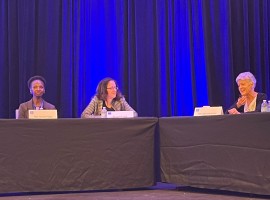NAWJ 2025 Midyear Meeting
Mar 20, 2025 @ 3:00PM - Mar 22, 2025 @ 11:30AM
Ann Arbor, MI

The NAWJ 2025 Midyear Meeting will take place at the Lawyers Club at the University of Michigan School of Law in Ann Arbor, Michigan and accommodations will be available at the Graduate Hotel a few blocks away. The best airport to fly into from out of town is the Detroit Metro Airport (DTW), which is about 40 minutes from the hotel.
REGISTRATION:
| Registration Rates | Regular Rate (through March 14) |
| Member Rate | $329.00 |
| Non-Member Rate | $389.00 |
REGISTRATION HAS CLOSED
The cancelation fee for persons who cancel before March 6, 2025, is $50. Registrants who cancel after March 6, 2025, will not be eligible for a refund.
HOTEL INFORMATION AND RESERVATIONS:
Graduate by Hilton Ann Arbor
615 E. Huron St.
Ann Arbor, MI 48104
Hotel group room block rate cutoff was February 26, 2025. To make a reservation after February 26, please book directly with the hotel: https://www.hilton.com/en/hotels/arbgagu-graduate-ann-arbor/
SPONSORS
We want to thank all of our 2025 Midyear Meeting sponsors!
| BrownGreer | Elizabeth K. Bransdorfer, Esq. |  |
 |
 |
Program and Schedule
Information subject to change, All times listed in EDT
| Thursday, March 20 | |
| 11:00 AM - 5:00 PM | Professional legal photographer Emma Burcusel will be available for styled professional headshots. Sessions are $100 and take approximately 10 minutes. |
| 11:30 AM - 4:00 PM | NAWJ Board of Directors Meeting |
| 4:15 PM - 5:30 PM | Planting the Seed Program - Law Student Mentorship |
| 4:30 PM - 5:30 PM | Resource Board Meeting |
| 5:30 PM - 7:00 PM | Opening Reception |
| Friday, March 21 | |
| 8:30 AM - 9:30 AM | Breakfast & Welcome Remarks from ABA President William R. Bay |
| 9:30 AM - 10:45 AM | Education Session
The Invisible Cost of Administering Justice: How Judges Can Prioritize Their Own Healing To Better Serve Themselves And Others Judges carry the immense responsibility of administering justice, yet the personal cost of this work is rarely acknowledged. This session will explore how a judge’s well-being directly impacts their ability to serve others with fairness, clarity, and compassion. Through reflective exercises and discussions, participants will consider how prioritizing their own care—physically, mentally, and emotionally—could help them serve others. The session will highlight the essential role of self-compassion, emphasizing that knowing oneself, recognizing shared humanity, and responding with kindness are not only vital for personal well-being but also for serving others with integrity and wisdom. |
| 11:00 AM - 12:15 PM | Education Session
Women in Prison and Family Preservation While in the US, women only account for 9% of the total prison population and 15% of the total jail population, they are growing at exponential rates compared to men. Historically, justice-involved women have been under-studied, simply placed in prisons and programs designed for men. Thus, gendered issues that women experience have been ignored in the larger field of study. Increasingly, we have learned that they commit crimes differently than men (largely non-violent, less serious), experience different challenges, and need different support than men in carceral setting. This session will focus on the gendered issues that arise for women around pregnancy, parenting, and separation from children during incarceration, including barriers and possible solutions.
Panelists: |
| 12:30 PM - 1:45 PM | Lunch with Speaker
Bridging the Gap: State Court Leadership in Increasing Access to Justice Join us for an insightful roundtable with Michigan Supreme Court Chief Justice Beth Clement and Michigan Supreme Court Justice and co-chair of the Justice For All Commission, Justice Brian Zahra, as moderated by Michigan Court of Appeals Judge and NAWJ President Michelle Rick. They will explore the critical efforts being led by courts to address and reduce the justice gap. Justice Clement will share her national expertise on the initiatives and reforms aimed at ensuring equitable access to justice for all, with a particular focus on vulnerable populations. Justice Zahra will share lessons learned from the work of the Justice for All Commission. Through innovative policies, procedural changes, and strategic partnerships, state courts are making strides toward a more inclusive and accessible legal system. This session will offer a unique opportunity to learn from the leading voices in the movement to close the justice gap and make justice truly accessible for everyone. Featuring Chief Justice Elizabeth Clement & Justice Brian Zahra |
| 2:15 PM - 3:30 PM | Education Session
How Can Specialty Courts Increase Access to Justice? With more than 200 specialty courts, including Drug and Sobriety Courts, Mental Health Courts, Veterans Treatment Courts and others, Michigan is a national leader in creating innovative court programs for people who interact with the justice system. These specialty courts work holistically with adults and youth to offer services and opportunities that foster healing and resiliency, empowerment and stability, with the ultimate goal of reducing recidivism and improving lives. This session explores how specialty courts are reframing “justice” and just outcomes and how these courts increase access to and opportunities for just outcomes. Panelists explore these topics through the lens of their experiences with tribal court, adult mental health court, juvenile human trafficking court, and unhomed persons court. In this session, you will:
Hon. Megan Cavanagh (Moderator) Hon. Mariam Bazzi Hon. Shauna Dunnings Hon. Allie Maldonado Mr. Jayesh Patel |
| 3:45 PM - 5:00 PM | Education Session
Justice in the AI Age: Supporting Self-Represented Litigants The large number of unsophisticated self-represented litigants (SRLs) presents significant challenges to the administration of justice. In some courts, upwards of 80-90% of family law cases involve at least one SRL. Studies show a high percentage of pro se claims fail to survive preliminary motions. This session explores how the use of artificial intelligence might help. Discover how AI-powered tools can aid judges in handling SRL cases effectively, enhance access to justice for SRLs, and streamline overloaded court operations. Explore ethical considerations and gain actionable insights for navigating the evolving landscape of law and AI. Upon completing this session, attendees will be able to:
|
| 6:15 PM - 8:00 PM | Dinner on own |
| 8:00 PM - 9:00 PM | Dessert Reception |
| Saturday, March 22 | |
| 8:00 AM - 9:00 AM | Breakfast |
| 9:00 AM - 10:30 AM | Education Session - Presented by JAMS
Making the Move: Best Practices, Ethics & Tips to Transition to ADR Transitioning to Alternative Dispute Resolution (ADR) can be a rewarding career change, but it requires a unique set of skills and ethical considerations distinct from those in judging or lawyering. This program is designed to help you determine if ADR is the right path for you and to guide you through the transition process. Join us to explore:
Gain insights from experienced panelists who have successfully made the switch and learn how to make your transition to ADR smooth and successful. Panelists:Maryam Hatcher, Esq. (Moderator) Joan Kessler, Esq., Ph.D. Hon. Denise Langford Morris (Ret.) Hon. Heather A. Welch (Ret.) |
Event Details
Highlights from Past Events












